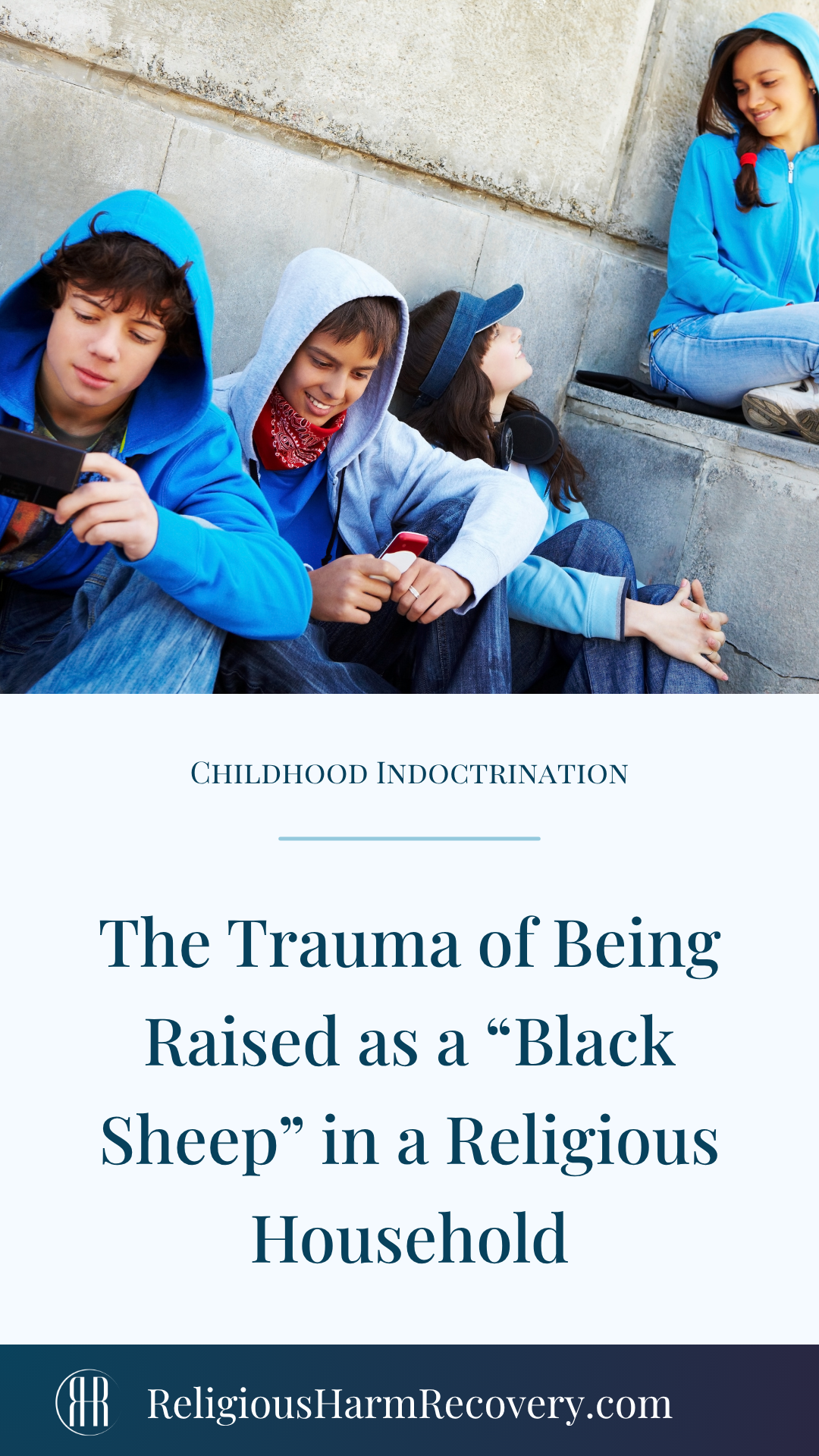The Trauma of Growing Up as a Black Sheep in a Religious Family

Growing up, I wasn’t the black sheep in my family, but my older brother was.
I watched from the sidelines as he was labeled “strong-willed,” “impulsive,” and “angry.”
And because we were raised in a conservative Evangelical Christian home, the underlying message was that he just wasn’t “right with god.”
These days, I feel so much sorrow for that younger version of him… Did he ever really stand a chance inside a system that valued compliance and conformity above everything else?
While there are few winners in the rigid subculture of fundamentalist Evangelical Christianity, my heart truly breaks for the ones who were rejected, blamed, and shamed simply for expressing the truest parts of themselves.
These are the black sheep.
Labeled in Childhood vs Labeled as Adults
In my religious harm recovery work, I often encounter people who have been labeled as black sheep.
Many of these folks felt this label slide into their lives in conjunction with some of their earliest childhood memories, while others didn’t receive the label until years later when they left the fold.
As it turns out, while my brother felt this label very early on, I received it much later after I deconverted from Evangelical Christianity and subsequently stopped playing by all the rules I had been so skilled at adhering to during my childhood and adolescence.
I guess being a “black sheep” isn’t really as innate as one might have originally thought… Rather, it’s a label that’s assigned to folks who don’t prostrate themselves before a system that demands total compliance at the expense of the Self.
Because I have felt the pain of the label in adulthood and was closely adjacent to the pain of this label in childhood, I wanted to write an article for all of you, for all of us, really, who have faced the uniquely painful experience of being shamed, blamed, and discarded for simply daring to be the fullest version of our authentic selves.
I am writing about the topic of Black Sheep in High Control Religions in two parts.
What This Article Covers
This is part 1 of my discussion about black sheep in high-control religions, so we will specifically be focusing on folks who received the black sheep label in childhood.
In the sections that follow, we’ll examine why certain children become labeled as the black sheep in religious families by exploring the specific traits and behaviors that make them targets in authoritarian systems.
We’ll also consider the psychological and relational trauma that results from this label, including the shame, isolation, and punishment black sheep often endure.
Lastly, we’ll look at lasting impact being cast as a black sheep can have on someone, including the challenges with identity, relationships, mental health, and self-worth.
My hope is that by understanding the dynamics at play, you’ll gain clarity about your own experience and feel less alone in the journey toward healing and self-acceptance.
To help you quickly get to where you want to go, use the table of contents below to help you navigate.
What Traits Make a Child a Target for the Black Sheep Label?
I’ve found in my own personal life as well as in my religious harm recovery work that when the black sheep label is applied in childhood, it typically gets attached to children who were more resistant to indoctrination.
They were the ones often on the radar of parents and religious leaders because they didn’t easily fit into the mold established by their family or religious group.
These were the children who didn’t just comply in order to keep everyone happy. Instead, they were the ones asking difficult questions, challenging authority, and maybe even questioning the system as a whole.
For those of you who identify as exvangelicals, the term strong-willed child, coined by James Dobson, may come to mind.
Essentially, the black sheep were the ones who actively resisted indoctrination.
The unfortunate reality is that, while children who were labeled as black sheep had a tremendous inner strength and a sharply attuned inner compass, they often endured deep suffering in authoritarian homes and high-control religions because the goal was always to “break their will.”
Why Some Families “Need” a Black Sheep
It’s important to understand that, within many religious families, the black sheep role didn’t happen by accident.
Instead, some families need for there to be a black sheep that other family members can then scapegoat.
A scapegoat is a family member who is blamed for the family’s problems, conflicts, or dysfunction, serving as an outlet for unresolved tension within the system (Minuchin, 1974).
Having a scapegoat in the family allows the family unit to preserve its image of harmony or righteousness by assigning blame to a single person who is the one supposedly causing all the problems.
In conservative religious settings, this dynamic can be especially pronounced.
When someone questions authority, refuses to conform, or expresses emotions that contradict the “godly” ideal, the family system may label them as rebellious, disrespectful, or “not right with God.”
This label keeps the family’s narrative intact while protecting others from facing their own discomfort or cognitive dissonance.
But for the child who has been assigned this role, the cost can be staggering because not only did it negatively impact their childhood experience, but it often impacts them well into adulthood, as well.
The Lasting Impact of Being Raised as a Black Sheep
If you were labeled as a black sheep in childhood, the isolation, shame, and rejection you felt as a child doesn’t just disappear once you reach adulthood. In fact, it may show up both psychologically and somatically even years later.
And there’s a reason for this. Research shows us that repeated social rejection is processed in the brain in ways that overlap with physical pain (Eisenberger, 2012).
Understanding this overlap helps explain why those early wounds are often carried in the body as well as the mind, sometimes resurfacing through anxiety, hypervigilance, or chronic tension.
In this next section, I’m going to cover in more depth what some of these wounds may look like in adulthood, but I want you to know that healing and recovery is still possible, even all these years later.
In fact, many people have recovered from these painful childhood experiences, fully embracing their wild, wonderful, and authentic selves.
As I review some of the lasting impacts of receiving the label of black sheep in childhood, please know that I’m not suggesting this is a life sentence.
Challenges in Relationships
As adults, the black sheep may still carry a deep sense of unworthiness, shame, or fear of rejection, even in relationships outside of their family.
Because early connection was tied to judgment and conditional acceptance, adult relationships can unconsciously trigger those same fears of disapproval or loss.
This can affect their ability to trust others or to feel truly accepted in their romantic relationships or their social and professional circles.
The internalized belief that they are flawed or “bad” may also manifest in feelings of inadequacy or self-doubt.
Because social rejection is encoded both emotionally and somatically, people often react to new relationship stress with hypervigilance, avoidance, or overcorrection such as excessive people pleasing or persistent defensiveness (Eisenberger, 2012).
Despite their best efforts, those who were labeled black sheep in their younger years may now struggle to truly believe they are deserving of love, respect, and belonging even in adulthood.
Painful Family Dynamics
Even after the black sheep has grown up and left the family home, the divisions created within the family often persist (Minuchin, 1974).
Children cast as black sheep are often othered in very obvious ways in their family of origin, which can create and “us vs. them” (or “us vs the black sheep”) dynamic among family members.
Unfortunately, the clear line between the ‘good’ children and the ‘problem’ child established during childhood often sets the tone for sibling dynamics that can be incredibly challenging to overcome in later years.
For some siblings, their own sense of survival within the family system may even feel contingent upon loyalty to the parents, which means aligning with the black sheep might cause siblings to lose their own sense of safety or belonging.
So they stay quiet or distant, even if they privately disagree with the family narrative or feel bad for their black sheep sibling.
The unfortunate reality is that in many families the “othering” of the black sheep was felt so early on that siblings did not get to form an authentic bond.
And trying to build that foundation in adulthood can often feel insurmountable.
Underlying all this is a need by the family system to maintain the narrative that the black sheep is responsible for the problems in the family, and moving beyond this narrative requires honest reflection and growth on the part of all the family members, including the parents.
That’s why rifts can survive decades and why reconciliation is often both rare and complicated unless the family system as a whole changes (Ellison, 2017).
The Struggle to Reclaim Identity
One of the most challenging and long-lasting effects of being labeled the black sheep is the struggle to reclaim one’s identity.
When you’re raised under a rigid system like a high-control religion, your identity is often defined not by who you truly are but by the label that has been imposed upon you.
For the black sheep, labels like “rebellious,” “difficult,” and “disobedient” become a script that is hard to stop acting out even when you want to let it go.
As adults, black sheep often spend years, and even decades, trying to unwind themselves from the identity that was imposed upon them.
They may feel like they don’t fully know who they are because they were never allowed to develop an authentic sense of self.
This identity work is intensified for people who leave high-control religions because leaving removes a primary social map and role structure.
Rebuilding identity after deconversion requires new meaning making and social supports, which is why the post-leaving period is often a vulnerable time for mental health and self concept (Streib, 2021).

Mental Health Challenges
Being labeled the black sheep can create lingering mental health challenges, largely because the label and the associated treatment result in significant relational trauma.
Research on prolonged childhood adversity shows strong links to long-term difficulties with self-esteem, emotion regulation, and complex trauma symptoms (Li & Liang, 2023).
Below are some of the most common mental health struggles that children labeled as black sheep may later face in adulthood.
Anxiety
The constant fear of rejection or punishment for not conforming can create chronic anxiety.
As adults, they may struggle to feel safe in various areas of their lives because they realized at an early age that safety and approval were tied to conformity and compliance.
And according to neuroscience research, repeated social rejection activates the same brain regions as physical threat, making anxiety reflexive and embodied (Li & Liang, 2023).
So this means that taking steps outside of what’s expected of them—whether in career, relationships, or personal choices—can trigger intense internal alarm, even when the external situation is objectively safe.
Depression
The emotional toll of being cast out or chronically isolated often settles into long-lasting sadness or depression.
And when grief over lost family connections goes unacknowledged—when there’s no ritual, no repair, no space to mourn—it can become chronic, deepening depressive symptoms over time.
This is what psychologists call ambiguous loss: a kind of grief that never fully resolves because the loss itself was never clearly named or honored (Boss, 1999).
Complex PTSD
For those who endured ongoing emotional neglect, abuse, or manipulation, trauma can evolve into complex PTSD (C-PTSD).
Symptoms may include difficulty trusting others, flashbacks of relational harm, emotional numbness, and trouble regulating feelings.
Research on developmental and cumulative trauma links prolonged interpersonal harm in childhood to higher risk of C-PTSD (Li & Liang, 2023).
Dissociation
When emotions feel too overwhelming or unsafe to process, some people disconnect from their bodies or feelings as a protective response.
Higher rates of dissociation are associated with childhood neglect and abuse, which aligns with reports from many who survived long-term emotional harm (Vonderlin, et al, 2018).
You might notice it as spacing out during conflict, feeling numb when you “should” feel something, or not quite feeling present in your own life.
If this resonates, know that dissociation was once protective, and with support, you can learn to feel safe in your body again.
Emotional Dysregulation
Growing up in a context where emotions were dismissed, shamed, or weaponized often leaves people struggling to name and regulate their feelings.
This can show up as sudden outbursts, numbness, or cycling between emotional extremes.
Without safe relational experiences in adulthood, these patterns can be difficult to interrupt.
If you are someone who has a limited “feelings vocabulary,” checking out the Wheel of Emotions can be a helpful place to start.
Patterns of Addiction
When childhood emotional pain goes unhealed, many people turn to behaviors or substances that offer temporary relief from overwhelming feelings.
For those who grew up as the black sheep, addiction often becomes a way of trying to self-regulate in the face of chronic dysregulation—a means of coping with shame, anxiety, grief, or emotional overwhelm that was never properly supported or processed in childhood.
Research consistently shows strong connections between childhood adversity and later substance use disorders. The landmark Adverse Childhood Experiences (ACE) Study demonstrated that individuals who experienced childhood trauma were significantly more likely to develop addictive behaviors in adulthood (Felitti et al., 1998).
If you’re struggling with an addiction, please know it’s not an indicator of any kind of personal flaw or weakness.
Rather, your addictive patterns are adaptive strategies that once helped you survive unbearable emotional pain.
But over time, addictions tend to become the source of the harm, rather than just a strategy for managing it.
Some of the most common addictions are:
- Substance use addictions
- Food addiction along with binging/purging or unhealthy restricting
- Shopping, spending, or gambling
- Sex, love, or relationship addictions
Where to Go From Here
If this contents of this article have resonated with you, you have weathered the burden of being cast into a role that no child should ever have to bear.
And for that, I am truly sorry.
As I mentioned at the beginning of this article, my brother was labeled a “black sheep,” and I witnessed first-hand the suffering he endured as he tried to find his way in adulthood.
If you’re still trying to find your way, I hope you’ve been able to connect to a therapist or Religious Harm Recovery Coach who understands the unique pain of this experience.
If haven’t yet connecting with a therapist, but you have been wanting to, this article is a helpful resource on how to find someone qualified who also understands religious trauma: How to Find a Religious Trauma Therapist.
You might also consider the following books:
You might also be interested in these articles:
- Why Your Religious Upbringing Left You Feeling Starved For Love
- High Control Religion & Mother Wounds
- 6 Ways Religious Trauma Can Manifest as Physical Symptoms
Citation List
Some Possible Next Steps:
If this article resonated with you and you’re looking to go deeper, here are a few things that may help:
Other Articles About Childhood Indoctrination:
-
The Lingering Impact of Emotional Neglect in Religious Homes
In my last post, I talked about how parents influenced by religious indoctrination often lean towards authoritarian parenting styles, which can lead their children to develop insecure attachment patterns. Read it here: How Authoritarian Parenting Creates an Insecure Attachment Style…
-
How Religious Authoritarian Parenting Creates Attachment Wounds
Folks raised in a high-control religion are more like to develop an insecure attachment style due to the prevalence of authoritarian parenting practices. This article explores specific ways an anxious, avoidant, or disorganized attachment style from an authoritarian religious upbringing may look in adulthood.
-
Why Your Religious Upbringing Left You Feeling Starved For Love
I definitely entered my teen and young adult years feeling “starved for love,” but I didn’t come to understand this about myself until recently. As someone who prided myself on being fiercely independent, even as a teenager, the idea that…


